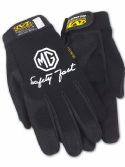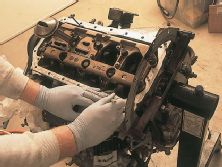One of the basic differences between a professional mechanic and an amateur is that a professional takes time to understand the risks and dangers of his work, and makes the effort required to protect himself from them. This is reflective of a change in philosophy. We have begun to recognize that people are more important than cars. Our bodies heal, but not perfectly, not endlessly. We only get one, and it needs to last 70, 80 or 100 years. We can't afford to treat it as a consumable.
While many home mechanics wouldn't think of cutting metal or wood without proper eye protection, fewer are as careful with their hands. Hands, after all, are highly washable. I think the right gloves should be considered just as important, though. The theory that no project is complete until one has donated blood to it doesn't work when you have a new project each day. The first scar may be a teenager's badge of honor, but find an old mechanic who has been working on cars for 40 years and he will have the most gnarled, torn-up hands you have ever seen. He, too, once received his first scar. Impacts and vibration from power tools can eventually lead to inflamed or arthritic joints, making it difficult to work at all. Grease, oil and solvents may wash off, but not before some of them are absorbed through the skin. In most cases, they are quickly removed by the liver, but their cumulative effect over time can cause big problems. Why take the risk?
To take a shorter view, no matter how cool a car is, women don't dig guys with grease permanently under their nails.
Inexpensive cotton gloves are a lot better than nothing, and are completely washable. Mechanix Wear has specialized in gloves and other protective clothing for mechanics for several years, catering to everyone from the enthusiast working at home or the track to professional race teams. The product line includes everything from the original glove, a simple, elastic-back, one-layer product, to multi-layered, impact-absorbing, heat- and flame-resistant gloves for the over-the-wall-with-a-66-lb-tire guys. I have used several of their gloves over the last few years, and in general, been very satisfied.
What most Mechanix Wear gloves don't have is fluid resistance. More and more enthusiasts, and some pros, work on cars with disposable latex gloves, but latex gloves' life expectancy when working on cars seems to be about 15 minutes. The problem is not mechanical durability, but chemical resistance. Mechanix Wear does market a multi-layered neoprene/latex glove, but blue nitrile rubber withstands automotive chemicals even better than neoprene. Thin, disposable nitrile gloves will last through most tasks, and a pair or two makes an excellent addition to one's portable toolbox. I bought a box of 100 gloves for $7.99 when Harbor Freight Tools had them on sale, and consider them essential. One cautionary note: Never wear gloves around rotating machinery, such as a lathe, power sander or drill press. If the glove gets caught in it, your whole arm, and even body, can be pulled in and wrapped around the mechanism, which is a lot worse than a simple scrape or cut.
If you're working with your hands, they deserve to have you take care of them.


